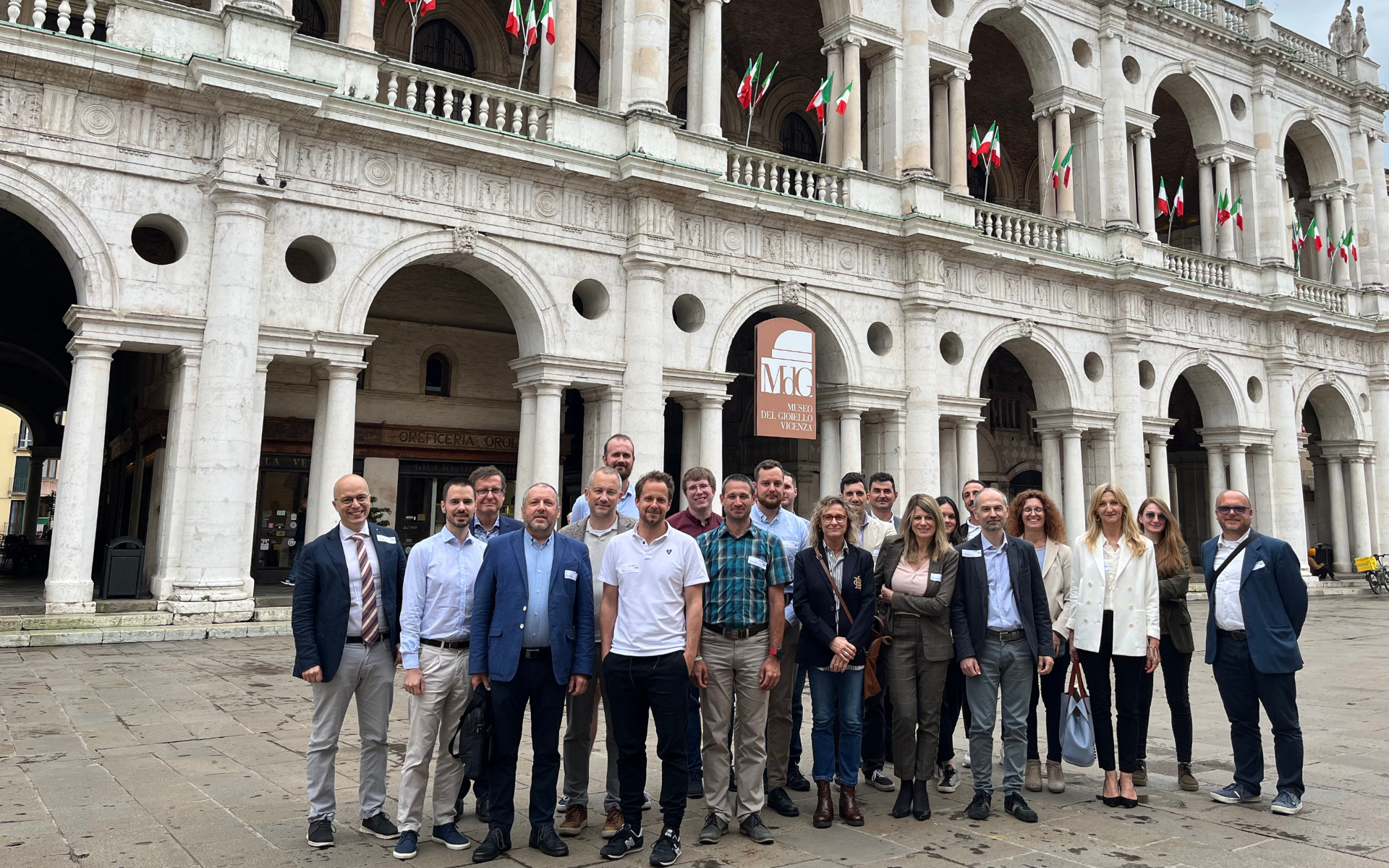On May 28 and 29, 2024, the consortium of the EnCLOD project convened in Vicenza, hosted by the Province of Vicenza, the lead partner of the project.
The EnCLOD project (Enhancing Governance Capacities of Local Authorities Using Open Data) is funded by the Interreg Central Europe programme. It aims to improve governance in five Central European territories by promoting the use of Open Data and IoT (Internet of Things) sensor networks. This initiative strengthens multi-level governance, engages civil society, and fosters public-private collaboration, driving innovation and economic prosperity. The EnCLOD project addresses the growing importance of data for governance and economic growth. Local authorities in Central Europe often struggle to effectively harness this data, while the private sector and civil society are rapidly advancing in digitalisation. Despite their extensive use of Open Data and IoT, the potential of these technologies to solve urban and social issues remains underutilised.
Started in May 2024, the project will run for 30 months and will see the involvement of 10 partners among which the Province of Vicenza, leader of the project, the University of Venice (IUAV), the DKV Debrecen Exclusive Public Transport Company, CITIQ, the Palacký University Olomouc, CityOne, the Urban Municipality of Nova Gorica, the University of Ljubljana, the University of Žilina and ALDA+. The meeting held on May 28 and 29 officially launched the activities of the EnCLOD project. In addition to the project consortium, the event also featured participation from Mr. Ritt Winfried, the Joint Secretariat contact point for EnCLOD, and Mr. Alberto De Sordi, from the Joint Programming Department European Territorial Cooperation and Macro Regional Strategies Unit. The first day began with Mr. Winfried presenting the context of the project and the role of the Joint Secretariat. This was followed by a brief explanation of the responsibilities of the National Contact Points by Mr. De Sordi. Following an introduction to the project by the Lead Partner, the five Project Pilot Areas were presented to the audience. The presentations began with the Province of Vicenza, which manages the provincial road network and will focus on road salting to enhance road safety during cold winters. This pilot will be carried out in collaboration with the University of Venice, CityOne, and CITIQ. Next, the City of Debrecen’s pilot project was discussed, highlighting its support for urban commuters and efforts to reduce excessive car traffic. DKV, along with CityOne, CITIQ, the Municipality of Debrecen, and Magyar Közút Nonprofit Zrt. (the body responsible for road maintenance in Hungary), will implement this action. The Municipality of Nova Gorica (Slovenia) will tackle the anticipated increase in car traffic due to a series of cross-border events and address the resulting air pollution challenges. The expected outcomes include improved air quality monitoring, strategic mobility planning, promotion of sustainable transport, and better traffic management. This pilot action will be supported by the University of Ljubljana and carried out in collaboration with CityOne and CITIQ. The University of Olomouc, in collaboration with CityOne, CITIQ, and the City of Olomouc, will implement a pilot project aimed at increasing measures against urban heat islands in the City of Olomouc (Czech Republic). Lastly, the University of Žilina will coordinate the pilot action in Žilina (Slovakia), focusing on increasing road safety through the creation of a ‘Traffic Safety Prevention Tool.’ This activity will be carried out in collaboration with the City of Zilina, CityOne, and CITIQ. The pilot’s presentation was followed by an overview of administrative matters, including information on project monitoring and a brief outline of the communication requirements set by the Interreg Central Europe programme. The first day concluded with a social dinner. The following day, May 29th, began with an in-depth exploration of the project’s activities, presented by the partners responsible. This included a detailed presentation of the communication activities planned within the project, both from a general perspective and from the standpoint of specific work packages. The meeting concluded with a renewed sense of collaboration and commitment among the partners. The discussions and presentations over the two days set a strong foundation for the EnCLOD project’s future endeavors. By leveraging Open Data and IoT sensor networks, the project aims to address critical urban and social issues across Central Europe, driving forward innovative solutions and fostering sustainable development. The consortium looks forward to the impactful outcomes that this collaboration will yield, ultimately enhancing the governance capacities of local authorities and improving the quality of life for citizens in the involved territories.
